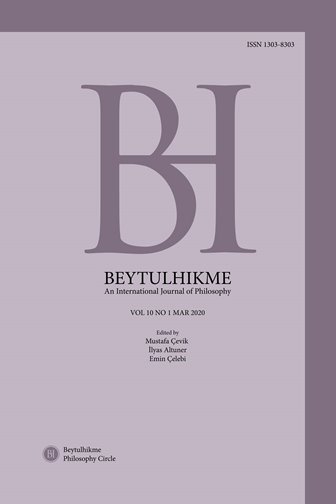Author :
Abstract
Kategorik yargı, bir konu ile yüklemden oluşur. Yüklemin konuya nispet edilmesi sonucunda yüklemleme oluşur. Aralarında hiçbir ilişki bulunmayan iki kavram arasında yüklemleme kurulamaz. Konu ve yüklem mutlaka birbiriyle bir noktada ilişkili olmalıdır. Bu ortak nokta, yargının birliğini sağlamaktadır. Bu çalışma ‘bir önerme veya yargıda konu ile yüklemin birliği nasıl sağlanır’? sorusuna verilen cevabı incelemektedir. Bu nedenle çalışmamız müteahhirin dönem kelamının etkili eserlerinden biri olan ve Nasîruddin Tûsî’nin (ö. 672/1273-74) kaleme aldığı Tecrîdu’l-İtikâd adlı eseri esas alarak bu soruya cevap vermeyi hedeflemektedir. Tûsî, bir önermede konu ve yüklemin birbirine özdeş olması gerektiğini belirtmektedir. Fakat ona göre bu özdeşlik tam bir özdeşlik değil, kısmî bir özdeşliktir. Yani konu ve yüklem bir noktada birleşmelidir. Çalışmamızda tam özdeşliğin niçin varsayılamadığı izah edilerek kısmî özdeşlik varsayımının bir analizi yapılmış ve yargının birliğini sağlayan teorinin kısmî özdeşlikçi yüklemleme teorisi olduğu sonucuna varılmıştır.
Keywords
Abstract
Categorical judgments consist of a subject and a predicate. Predication occurs when the predicate is attributed to the subject. Predication cannot be made between two concepts in which there is no relation between them. Hence subject and predicate must be related at least one point. This common point ensures judgmental unity. This study examines the answer to the question ‘how the identity of the subject and predicate is ensured in a judgment or a proposition’. Therefore, our study aims to answer this question by dealing with Tajrid al-I'tiqad which was one of the most efficient works in mutaakhkhirun era and written by Nasir al-Din al-Tusi (d. 672/1273-74). Tusi remarked that subject and predication must be identical in a proposition. Yet according to him, this identity is not numerically identity but identity. Namely, the subject and predicate must be united at one (common) point. In our study, why exact identity cannot be supposed/counted is explained, the assumption of qualitatively identity is analyzed and concluded that the qualitatively identity theory ensures the required unity in a judgment.
Keywords
- Apaydın, Y. (2019). Metafiziğin Meselesini Temellendirmek: Tecrid Geleneği Bağlamın- da Umur-ı Amme Sorunu. İstanbul: Endülüs Yayınları.
- İsfahani, Ş. (2012). Tesdîdu’l-Kavâid fî Şerhi Tecrîdi’l-Akâid. Kuveyt: Daru’z-Ziya.
- Tusi, N. (1974). Ta'dîlü’l-Mi’yâr fî Nakdi Tenzîli’l-Efkâr. Mantık ve Mebâhisu’l- Elfâz. Tahran: Müessese-i Mutaleât-ı İslâmî. Öz: Kategorik yargı, bir konu ile yüklemden oluşur. Yüklemin konuya nispet edilmesi sonucunda yüklemleme oluşur. Aralarında hiçbir ilişki bulunmayan iki kavram arasında yüklemleme kurulamaz. Konu ve yüklem mutlaka birbiriyle bir noktada ilişkili olmalıdır. Bu ortak nokta, yargının birliğini sağlamaktadır. Bu çalışma ‘bir önerme veya yargıda konu ile yüklemin birliği nasıl sağlanır’? sorusuna verilen cevabı incelemektedir. Bu nedenle çalışmamız müteahhirin dönem kelamının etkili eserlerinden biri olan ve Nasîruddin Tûsî’nin (ö. 672/1273-74) kaleme aldığı Tecrîdu’l-İtikâd adlı eseri esas alarak bu soruya cevap vermeyi hedeflemektedir. Tûsî, bir önermede konu ve yüklemin birbirine özdeş olması gerektiğini belirtmektedir. Fakat ona göre bu özdeşlik tam bir özdeşlik değil, kısmî bir özdeşliktir. Yani konu ve yüklem bir noktada birleşmelidir. Çalışmamızda tam özdeşliğin niçin varsayılamadığı izah edilerek kısmî özdeşlik varsayımının bir analizi yapılmış ve yargının birliğini sağlayan teorinin kısmî özdeşlikçi yüklemleme teorisi olduğu sonucuna varılmıştır. Anahtar Kelimeler: Yüklemleme, özdeşlik, önerme, yargı, anlam.





